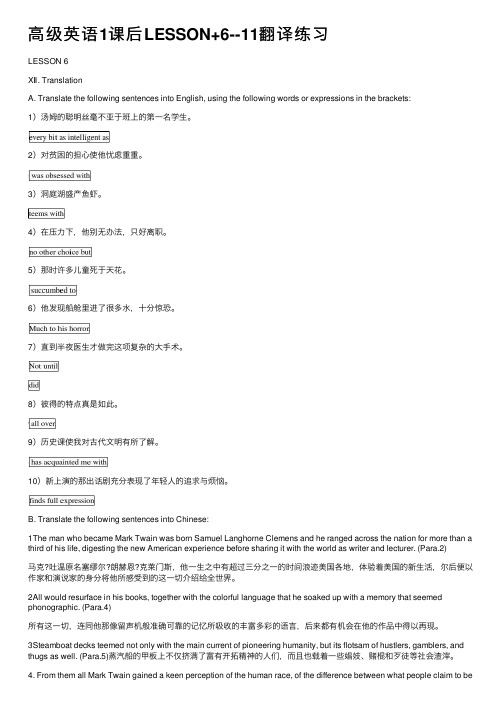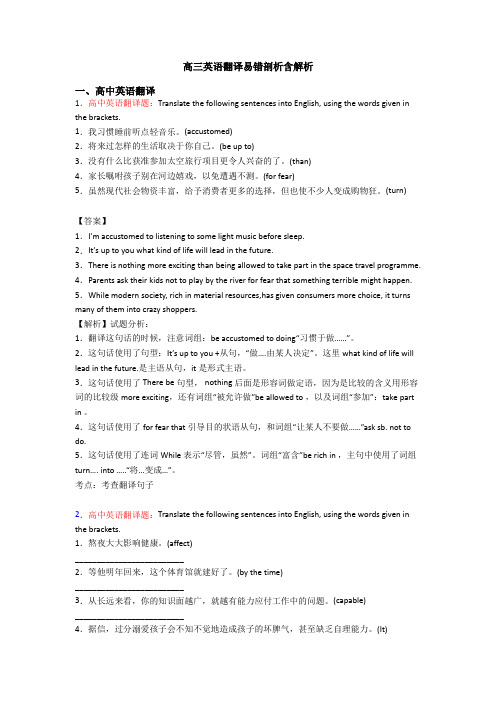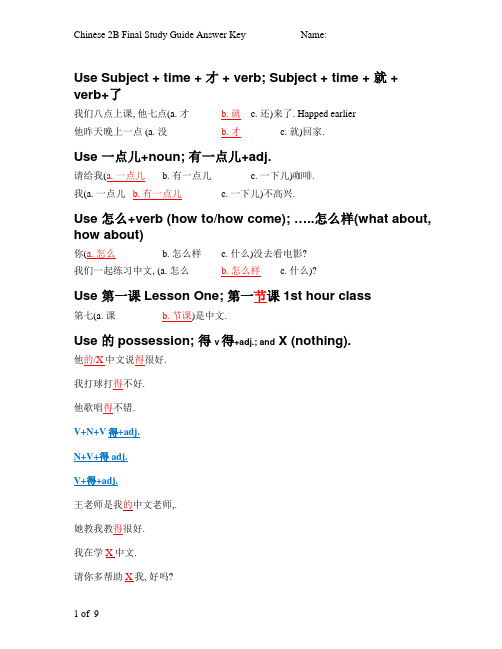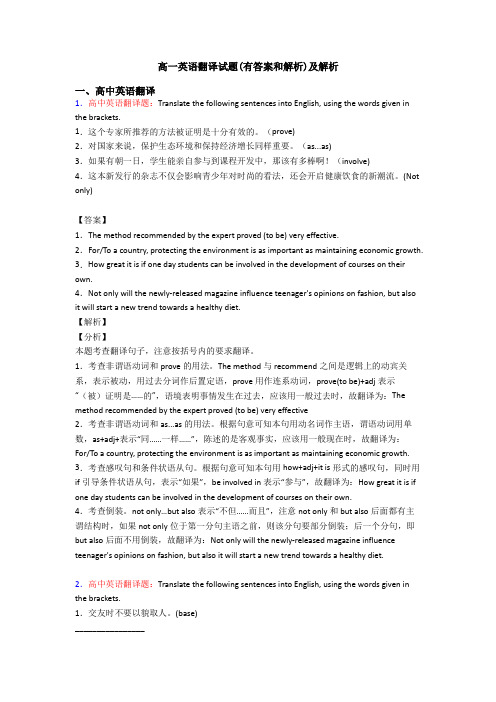TranslatethesesentencesintoEnglish
大学体验英语综合教程第三版第四册课后答案

Unit1Passage a1。
Taxes are a(n) ____________ which may fall on everybody.2. We ____________ the authority's decision not to close the hospital.3. The doctor's instructions must be ____________ exactly;the sick man’s life depends on it.4。
Do these opinion polls really ____________ what people are thinking?5. I prefer to think of memorization as a stepping—stone to____________ in use of words and phrases。
6。
In her office memos she tended to____________ the work done by her staff.7. The history of railroad transport has partly been a history of____________ for greater efficiency and profit。
8。
He took on the new post without having the faintest idea of what it____________ .9. He is____________ one of the greatest experts in that field.10. Absolute secrecy is essential.____________ , the fewer who are aware of the project the better。
高级英语1课后LESSON+6--11翻译练习

⾼级英语1课后LESSON+6--11翻译练习LESSON 6Ⅻ. TranslationA. Translate the following sentences into English, using the following words or expressions in the brackets:1)汤姆的聪明丝毫不亚于班上的第⼀名学⽣。
2)对贫困的担⼼使他忧虑重重。
3)洞庭湖盛产鱼虾。
4)在压⼒下,他别⽆办法,只好离职。
5)那时许多⼉童死于天花。
6)他发现船舱⾥进了很多⽔,⼗分惊恐。
7)直到半夜医⽣才做完这项复杂的⼤⼿术。
8)彼得的特点真是如此。
9)历史课使我对古代⽂明有所了解。
10)新上演的那出话剧充分表现了年轻⼈的追求与烦恼。
B. Translate the following sentences into Chinese:1The man who became Mark Twain was born Samuel Langhorne Clemens and he ranged across the nation for more than a third of his life, digesting the new American experience before sharing it with the world as writer and lecturer. (Para.2)马克?吐温原名塞缪尔?朗赫恩?克莱门斯,他⼀⽣之中有超过三分之⼀的时间浪迹美国各地,体验着美国的新⽣活,尔后便以作家和演说家的⾝分将他所感受到的这⼀切介绍给全世界。
2All would resurface in his books, together with the colorful language that he soaked up with a memory that seemed phonographic. (Para.4)所有这⼀切,连同他那像留声机般准确可靠的记忆所吸收的丰富多彩的语⾔,后来都有机会在他的作品中得以再现。
高三英语翻译易错剖析含解析

高三英语翻译易错剖析含解析一、高中英语翻译1.高中英语翻译题:Translate the following sentences into English, using the words given in the brackets.1.我习惯睡前听点轻音乐。
(accustomed)2.将来过怎样的生活取决于你自己。
(be up to)3.没有什么比获准参加太空旅行项目更令人兴奋的了。
(than)4.家长嘱咐孩子别在河边嬉戏,以免遭遇不测。
(for fear)5.虽然现代社会物资丰富,给予消费者更多的选择,但也使不少人变成购物狂。
(turn)【答案】1.I’m accustomed to listening to some light music before sleep.2.It’s up to you what kind of life will lead in the future.3.There is nothing more exciting than being allowed to take part in the space travel programme. 4.Parents ask their kids not to play by the river for fear that something terrible might happen. 5.While modern society, rich in material resources,has given consumers more choice, it turns many of them into crazy shoppers.【解析】试题分析:1.翻译这句话的时候,注意词组:be accust omed to doing“习惯于做……”。
2.这句话使用了句型:It’s up to you +从句,“做….由某人决定”。
Please translate the following sentences into English - billinger11

Use Subject + time + 才 + verb; Subject + time + 就 +verb+了我们八点上课, 他七点(a. 才 b. 就 c. 还)来了. Happed earlier他昨天晚上一点 (a. 没 b. 才 c. 就)回家.Use 一点儿+noun; 有一点儿+adj.请给我(a. 一点儿 b. 有一点儿 c. 一下儿)咖啡.我(a. 一点儿 b. 有一点儿 c. 一下儿)不高兴.Use 怎么+verb (how to/how come); …..怎么样(what about, how about)你(a. 怎么 b. 怎么样 c. 什么)没去看电影?我们一起练习中文, (a. 怎么 b. 怎么样 c. 什么)?Use 第一课Lesson One; 第一节课1st hour class第七(a. 课 b. 节课)是中文.Use 的possession; 得v得+adj.; and X (nothing).他的/X中文说得很好.我打球打得不好.他歌唱得不错.V+N+V得+adj.N+V+得adj.V+得+adj.王老师是我的中文老师,.她教我教得很好.我在学X中文.请你多帮助X我, 好吗?那本X中文书是我的.Construct the sentences.1.你几点平常开始星期四上课(Usually on Thursdays what time do you startto have class?)平常你星期四几点开始上课?你平常星期四几点开始上课?2.你请第七课给念的我们课文(Please readLesson seven text to us.)请你给我们念第七课的课文.3.听录音忙我没昨天晚上很(I was very busy, didn’t listen to therecording last night.)昨天晚上我很忙,没听录音.4.半夜十二点我才昨天睡觉(Last night I didn’t sleep till midnight.)昨天我半夜十二点才睡觉.5.写字写真得他慢(He writes really slowly.)他写字写得真慢.Please fill in the blanks with Chinese characters. (use the Fill in Blanks Exercise to study)九点钟到(arrive/go) 教室去(to) 上课. 第一节课 (first hour class) 是中文课. 老师教(teach) 我们发音(pronunciation) , 生词(new words) 和语法(grammar) , 也教(teach ) 写汉字 (write characters). 还给了我们(us) 一篇(measure word for text)新课文 (new text) . 这篇课文很有意思 (very interesting) .下午 (afternoon) 去图书馆 (go to the library) 看报(read newspaper) .Please translate the following sentences into English.1.你上个星期考试考得怎么样?.How did you do on your test last week?2.你哪天早上要去学校打球?Which morning will you go to school to play ball?3.因为王朋帮我练习中文,所以我功课做得很快.Because Wang Peng helps me practice Chinese,therefore, I did my homework really fast.4.除了专业课以外,我还得学中文.Besides major classes, I also need tostudy Chinese.5.我的中国朋友常常跟我一起练习中文,所以我中文进步得很快. My Chinese friends often with me togetherpractice Chinese, therefore, my Chineseimproved very fast.Please use the words provided to translate the sentences into Chinese. 以前, 以后, 就, 才. 正在1.He likes to eat breakfast right after he gets up.他起床以后吃早饭.2.We had a meeting at 2:45 p.m., she didn’t come until 5:00 p.m.我们下午2:45开会,她下午5点才来.3.I often read newspaper before I go to bed.我常常睡觉以前看报.4.We eat lunch at noon, he came at 10:00 a.m.我们中午吃午饭, 他上午10点就来了.5.When I went to his dorm, he was reading the book.我去他宿舍的时候, 他正在看书.Please select the correct answers. There is only one best answer for each question.1.(c ) 请_______他明天有中文考试.a.说speakb.教teachc.告诉telld.打电话call2.(b) 他_________是一个医生.a.正在currently+vingb.以前beforec.那儿thered.谁who3.(c ) 我_________在图书馆看书.a.的时候whileb.什么时候what timec.有时候sometimesd.一边4.(a ) 他__________常看电视.a.吃饭的时候b.一边吃饭c.正在吃饭5.(c ) ________是学生餐厅吗?a.哪儿whereb.在哪儿at wherec.那儿thered.什么6.(c ) 学生们_______ 考试.a.一边b.什么时候whenc.正在currently7.(a )李老师_________回中国了.a.已经alreadyb.开始startc.正在currently8.(c )我妹妹喜欢_________听音乐_________看书.a.的……时候b.正在……正在……c.一边……一边……d.一边……的时候……9.(c )下午我要______餐厅______吃饭.a.去……去…….b.到……到……c.到……去……d.到……回……10.(b )老师到教室_________他们_________看书.a.正在……正在…….b.的时候……正在……c.什么时候……正在……d.一边……一边……11.(c )我做了功课以后______去朋友家玩儿.a.一边b.刚才c.就d.的时候12.(c )你___________睡觉?a.有时候b.的时候c.什么时候d.多少时候13.(c )你教我___________, 可以吗?a.问题b.教中文c.电脑d.照片14.(c )我们上课_______预习课文.a.的时候b.以后c.以前Please make corrections of the sentences. (12 points) 1.我进他的宿舍,他一边听音乐.我进他的宿舍的时候, 他正在听音乐.2.我的宿舍没有电话, 所以打电话不能.我的宿舍没有电话, 所以不能打电话.3.他今天早上起床以前才听录音.他今天早上起床以后(就)听录音.4.他一边喜欢听音乐以外, 一边喜欢打球.他除了喜欢听音乐以外, 还喜欢打球.5.我进他的宿舍,他一边听音乐.(When I entered his dorm, he was listening to music.) 我进他的宿舍的时候, 他正在听音乐.6.他去餐厅常常吃饭. (He often goes to the cafeteria to eat.)他常常去餐厅吃饭.7.他今天早上起床以前才听录音. (He listened to his tapes right after he got up thismorning.)他今天早上起床以后听录音.8.你明天来我家来吃晚饭吧. (Come and have dinner at my house tomorrow.)你明天来我家吃晚饭.9.老师教我们写字,还给我们一篇课文了. (The teacher taught us how to writecharacters, and gave us a reading text.)老师教我们写字, 还给了我们一篇新xīn, new课文.Read the following email message and answer questions.小文:你好!谢谢你那天在图书馆帮我复习中文语法.我的中文不好,请你别笑我.那天我不知道你的名字,但是后来我的朋友告诉我, 你有一个漂亮的中文名字.我还知道, 你这个学期除了电脑专业课以外, 还在学英文. 这个周末有一个中国电影, 希望你能来看.有空的时候给我打个电话, 好吗? 我的电话是555-5555.小美Questions:1.( ) Where did Xiao Mei and Xiao Wen review together the other day?a.At Xiao Mei’s houseb.At schoolc.In thelibrary2.( ) What is the relationship between Xiao Mei and Xiao Wen?a.They just met not too long agob.They are classmatesc.They are best friends3.( ) Where did Xiao Mei get the information about Xiao Wen?a.From Xiao Wen himselfb.From the librarianc.From her friends4.( ) According to Xiao Mei, Xiao Wen is _________________.a. A computer science major who studies Englishb. A Chinese major who studies computer sciencec. A student who majors in Chinese and computer science.5.( ) Xiao Mei hopes that Xiao Wen will _________.e to see the movie but not call her.b.Call her but not to come to see the movie.c.Call her and come to see the movie.我和同学们都不喜欢考试,但是我们的中文老师常常给我们考试.我们喜欢唱歌,跳舞,可是我们的老师不喜欢唱歌,也不喜欢跳舞,很没意思.她说我们得常常听中文,练习说中文.要是我们听了,练习了,她很高兴.要是我们没听,没练习,她就很不高兴.有的时候,我们还得去她的办公室请她帮我们复习.要是老师不来学校上课,不给我们考试,要是老师在家喝茶,看电视,聊天,那不是很好吗?Questions:1.“我”和同学们喜欢考试吗?2.我们的中文老师是常给我们考试还是常和我们一起唱歌,跳舞?3.老师觉得我们应该怎样学中文?4.如果我们没学习,老师会怎么样?5.我们喜欢什么样的老师?Please read the Diary, and then answer the True or False questions.我今天早上六点起床,吃了早饭以后就到学校去上课.第一节课是英文课. 我们今天有英文考试. 我昨天晚上复习得很晚,所以我考得不错.第二节课是体育课(GYM), 我们打蓝球. 我打完球就去洗澡了.第三节课是电脑课. 我觉得电脑课很有意思. 十一点我和朋友到学生餐厅吃午饭.我们一边吃饭一边聊天儿.吃完午饭以后,我们就去上中文课了. 我们看了中文电影. 第五节课是画画儿. 我画画儿画得不好.晚上六点,我和爸爸,妈妈到中国餐厅去吃饭. 我们都很喜欢吃中国菜.吃完饭以后我们就回家了.我睡觉以前做了功课,还复习了中文生词和语法. 我十点就上床睡觉了.1.( ) 我的第四节课是中文课.2.( )今天体育课,我们游泳了.3.( )我喜欢电脑课.4.( )我和爸爸妈妈都不喜欢中国菜.5.( ) 晚上我在家吃晚饭.6.( )我和朋友到中国餐厅去吃午饭.7.( )我没做功课就睡觉了.8.( ) 我洗完澡以后就去打球了.9.( ) 我们今天有中文考试.10.( ) 我今天考试考得不错.Translate the following passage into Chinese:My younger sister did not learn Chinese well. She didn’t like listening to recording and didn’t practice speaking, so she did not speak well. She didn’t like studying grammar or writing characters. That was wh y she didn’t do well on examinations. But after she met aChinese friend, she often reviewed Chinese with her Chinese friend in the library. Now, she like listening to the audio recording and she also writes characters pretty well.________________________________________________________________________ ________________________________________________________________________ ________________________________________________________________________ ________________________________________________________________________ ________________________________________________________________________ ________________________________________________________________________ ________________________________________________________________________ ________________________________________________________________________ ________________________________________________________________________。
高一英语翻译试题(有答案和解析)及解析

高一英语翻译试题(有答案和解析)及解析一、高中英语翻译1.高中英语翻译题:Translate the following sentences into English, using the words given in the brackets.1.这个专家所推荐的方法被证明是十分有效的。
(prove)2.对国家来说,保护生态环境和保持经济增长同样重要。
(as...as)3.如果有朝一日,学生能亲自参与到课程开发中,那该有多棒啊!(involve)4.这本新发行的杂志不仅会影响青少年对时尚的看法,还会开启健康饮食的新潮流。
(Not only)【答案】1.The method recommended by the expert proved (to be) very effective.2.For/To a country, protecting the environment is as important as maintaining economic growth. 3.How great it is if one day students can be involved in the development of courses on their own.4.Not only will the newly-released magazine influence teenager's opinions on fashion, but also it will start a new trend towards a healthy diet.【解析】【分析】本题考查翻译句子,注意按括号内的要求翻译。
1.考查非谓语动词和prove的用法。
The method 与recommend之间是逻辑上的动宾关系,表示被动,用过去分词作后置定语,prove用作连系动词,prove(to be)+adj表示“(被)证明是……的”,语境表明事情发生在过去,应该用一般过去时,故翻译为:The method recommended by the expert proved (to be) very effective2.考查非谓语动词和as...as的用法。
英语课本答案

Unit 1Greeting and IntroductionRead and DoKeys to Language Points1. Translate the following sentences into English.1) 大家认为有必要对青年学生进行传统教育。
It is considered necessary to give the young students traditional education.2) 我认为放弃这个面试的机会太遗憾了。
I consider it a great pity to give up the chance of the interview.2. Translate the following sentences into English.1) 我们每个人都必须遵守这个重要的决定。
Everyone of us ought to abide by this important decision.2) 不管做什么事,都应遵循科学规律。
Whatever you do, you should abide by scientific laws.3. Translate the following sentences into English.1) 他不再像以前那个样子了。
He is not what he used to be.2) 以前中国人见面时,通常相互鞠躬致意。
Chinese used to bow to greet each other when they met.4. Translate the following sentences into English.1) 朋友之间往往只用“嗨”来打招呼。
Frie nds tend to say “Hi” as a greeting to each other.2) 书信有可能被电子邮件所替代。
Written letters tend to be replaced by E-mails.5. Translate the following sentences into English.be / get used to sth. / doing sth.1) 他已经非常不习惯没有网络的生活。
大一上学期英语翻译

一1. Translate the following sentences into English. 1. 对于网络课程,学生不仅可以选择何时何地学习,在回答问题之前他们还可以有时间思考答案。
Not only can students choose when and where to learn for an online course, but they can also take time to think through answers 2. 网上学习的想法使她非常兴奋,而他认为网上学习毫无意义和用处。
网上学习的想法使她非常兴奋,而他认为网上学习毫无意义和用处。
网上学习的想法使她非常兴奋,而他认为网上学习毫无意义和用处。
She is excited by the idea of online learning while he considers it meaningless and useless. 3. 与以英语为母语的人交谈是非常有益的体验,从中我们能学到许多东西。
与以英语为母语的人交谈是非常有益的体验,从中我们能学到许多东西。
Communicating with native English speakers is a very rewarding experience from which we can learn a lot. 4. 如今,越来越多的人可以利用互联网查找他们需要的信息。
如今,越来越多的人可以利用互联网查找他们需要的信息。
Today, more and more people have access to the Internet through which they look for the information they need. 5. 他要她放弃工作在家照顾孩子,但是她觉得这个要求太过分了。
他要她放弃工作在家照顾孩子,但是她觉得这个要求太过分了。
He wants her to give up working and stay home to look after the children. She feels, however, that this is too much for her. 6. 既然我们已经学完这门课程,就应该多做些复习。
大学英语

大学英语Translate the following sentences into English .1.你能给我帮个忙吗?Can you give me some help ?2.我们给他在这个旅馆预定一个比较安静的房间吧。
Let’s reserve a quiet room in the hote l for him.3.她是系里唯一的一位喜欢弹钢琴的女孩子。
She is the only girl who enjoys playing the piano in the department.4.快点!飞机还有半个小时就要起飞了。
Hurry up. The plane is taking off in half an hour.5.我要一杯咖啡和两片面包。
I’ll have a cup of coffee and two pieces/slices of bread.6.数学是我最感兴趣的课程。
Mathematics is the subject I feel most interested in.7.谢谢你给我很多建议。
Thank you for the much advice you’ve given me.8.失败是成功之母。
Failure is the mother of success.9.体育有益健康。
Sports are good for health.10.我想约见史密斯大夫。
I’d like to make an appointment to see Dr. Smith.11.把电视声音拧小点。
天气预报还没开始呢。
Turn down the TV a bit. The weather forecast hasn’t begun yet.12.多参加一些社会活动对我们大有好处。
It will do us a lot of good to take part in more social activities.13.玛丽显得比实际年龄要年轻。
- 1、下载文档前请自行甄别文档内容的完整性,平台不提供额外的编辑、内容补充、找答案等附加服务。
- 2、"仅部分预览"的文档,不可在线预览部分如存在完整性等问题,可反馈申请退款(可完整预览的文档不适用该条件!)。
- 3、如文档侵犯您的权益,请联系客服反馈,我们会尽快为您处理(人工客服工作时间:9:00-18:30)。
时态 1. 如果主句是一般现在时或一般将来时, 宾语从句的时态不受限制, 可根据实际 表达的需要来确定。如: Jenny knows the man was flying a kite at that time. You will understand why I did it one day. 总有一天你会明白我为什么那样做。
1. I was scared at first, but shouting did help. 此句相当于 I was scared at first, but shouting helped. 原句是一种表现强 调的句式。英语中, 可用助动词do对 谓语动词进行强调, 构成强调句。
e.g. Please do be careful. 请一定小心。 I do agree with you. 我完全同意你的意见。 He did warn you other day, remember? 他前两天就告诫过你, 还记得吗?
1. Alice was scary at first. √ 2. Alice thinks the new ride is actually fun. √ 3. He Wei thinks Fun Times Park restaurant severs delicious food. ×
Read the third and fourth scenes, true or false the sentences. 1. A rock band plays in Water City Restaurant every evening. √ 2. Alice and He Wei can go later to the restaurant. ×
4. 对不起,我不确定怎样到那。 ______, Sorry I am ______ not ______ sure how to get there. 5. 你能告诉我们今晚乐队什么时候开始演奏吗? Can you tell us ______ when ____ the ______ band ______ starts playing this evening? 6. 晚上8点开始。 It starts at 8:00 p.m. 7. 我想知道接下来我们该去哪儿。 I _______ wonder where we _______ should _____ go _____. next 8. 你应该试试那个新的乘骑设施。 You should try that new ride over there.
3. I suggest Water City Restaurant in Water World. suggest作动词, 可意为“显示; 间接表 明”, 后可接宾语从句。 e.g. His behavior suggested (that) he was a kind man. 他的行为显示他是个好人。
Translate these sentences into English.
1. 请你告诉我怎样去书店好吗? Could you please tell me how to get to the bookstore?
2. 打扰了, 你知道我在哪能买到一些邮票 吗? Excuse me, do you know where I can buy some stamps?
he restrooms are first? ...
Are you excited to try these in the fun park?
How do you think the ride? Is it fun or scary? Do you want to have a try?
3. 我想知道公园今天什么时候关门。 I wonder when the park closes today. 4. 银行和超市之间有一个餐馆。 There’s a restaurant between the bank and the supermarket.
Role-play the conversation in 2d.
Read the first scene, true or false 3a the sentences.
1. Alice and He Wei are in Water World. 2. The new ride looks scary. √
×
Read the second scene, true or false the sentences.
2. 如果主句是一般过去时, 宾语从句用 过去时态的某种形式。如: I thought he had gone to town that day. 我以为他那天进城去了。
2. What is special about Uncle Bob’s restaurant? A rock band plays there every evening. 3. Should Alice and He Wei get there early for dinner? Why? Yes. The restaurant is always busy, so they should get there early to get a table.
Alice and He Wei talked about Uncle Bob’s. Alice thought this restaurant looked interesting. It seemed a rock band plays there every evening. He Wei suggested that they could have dinner there.
How did Alice and He Wei think of the new ride?
Alice thought that it looked pretty scary. He Wei thought that it would be fun.
After the ride, Alice and He Wei talked about their feeling. Alice thought that was fun! She was scared at first, but shouting really did help. He Wei told Alice that “You never know until you try something.”
This is Fun Times Park, the biggest park in my city! I’m excited to try the rides!
Where should we start? There’s Space World, Water World, Animal World …
suggest作“建议”讲时, 应注意以下两点: 1) suggest doing sth. 建议做某事 e.g. I suggested going home. 我建议回家。 2) suggest后接从句时, 从句常用虚拟语 气, 谓语由“should + 动词原形”构成, should可以省略。 e.g. I suggested that we should go home. 我建议我们回家。
另外, suggestion是suggest的名词形式, 作“建议”讲时, 是可数名词。 e.g. Do you have any suggestions? 你有什么建议吗?
4. The restaurant is always busy at that time, so come a little earlier to get a table. 用于“就餐”的语境时, 形容词busy 相当于“吃饭人多; 餐厅拥挤”的意 思; 动词短语to get a table类似于汉语 “定餐桌; 占位子”等意思。
Read the conversation again and answer the questions below. 1. Why did Alice not want to go on the new ride? How did she feel after the ride? Because she thought the ride looked pretty scary. She was glad that she tried it, and she found the ride fun.
3b Underline the questions or
statements in the conversation that ask for information. Rewrite them in a different way. e.g. I wonder where we should go next. Could you tell me where we could go next?
(2) try doing sth. 表示尝试着做某事 e.g. -- I usually go there by train. 我通常乘火车去那儿。 -- Why not try going by boat for a change? 为什么不换乘船呢? (3) try one’s best 尽某人最大的努力 e.g. Thank you. I will try my best. 谢谢你。我会尽力而为的。
1. 打扰了,你知道我能在哪买到一些药? can Excuse me, do you know where ____ I _____ buy some medicine? 2. 当然,顺着这条街有个超市。 Sure. There’s a supermarket down the street. 3. 请你告诉我怎样到邮局好吗? Could you please tell me _____ how _____ to get to the post office?
